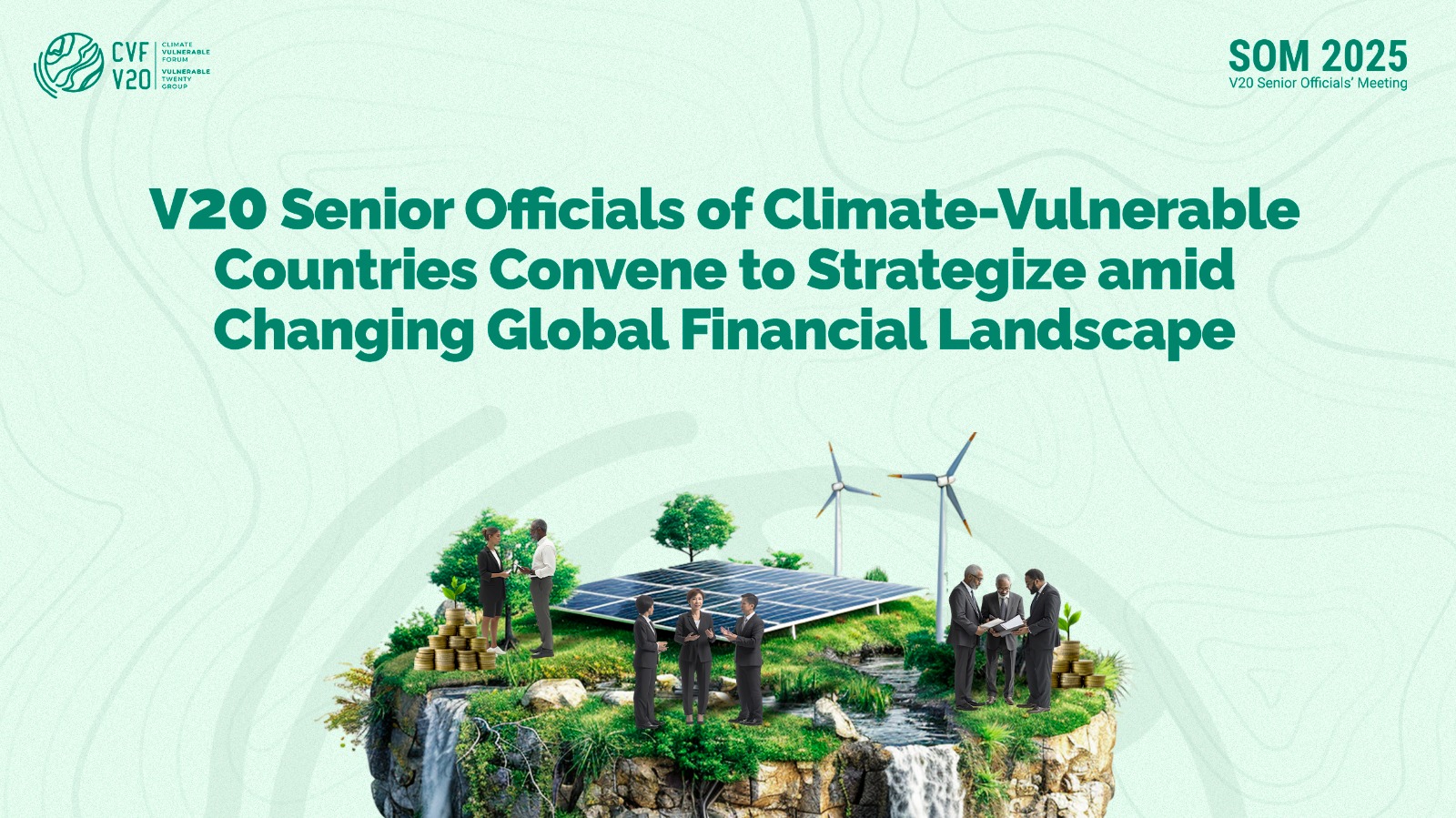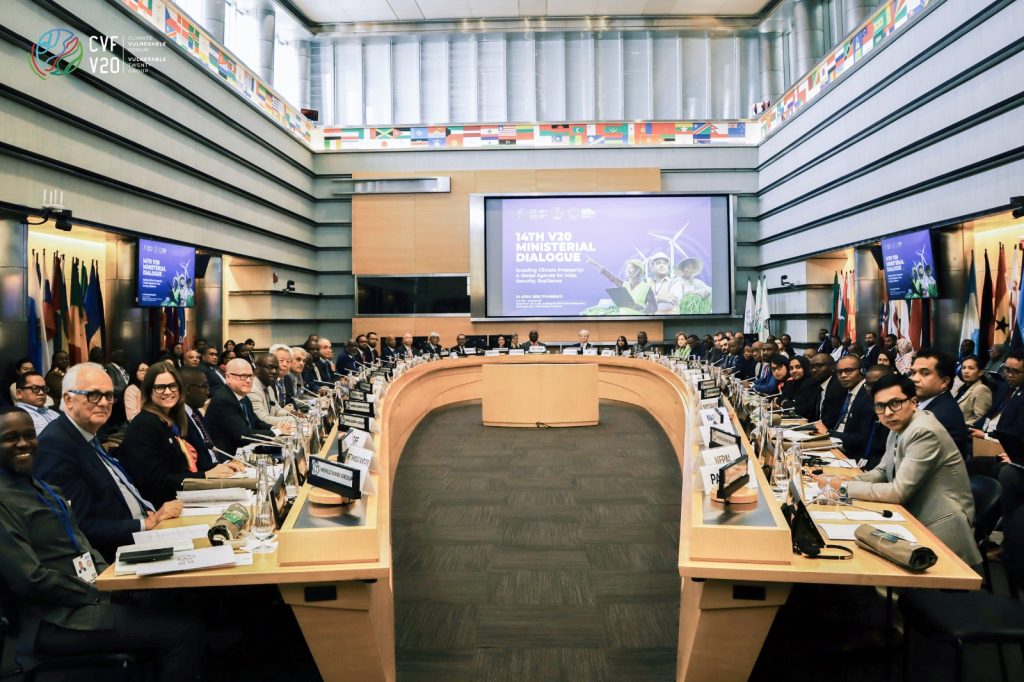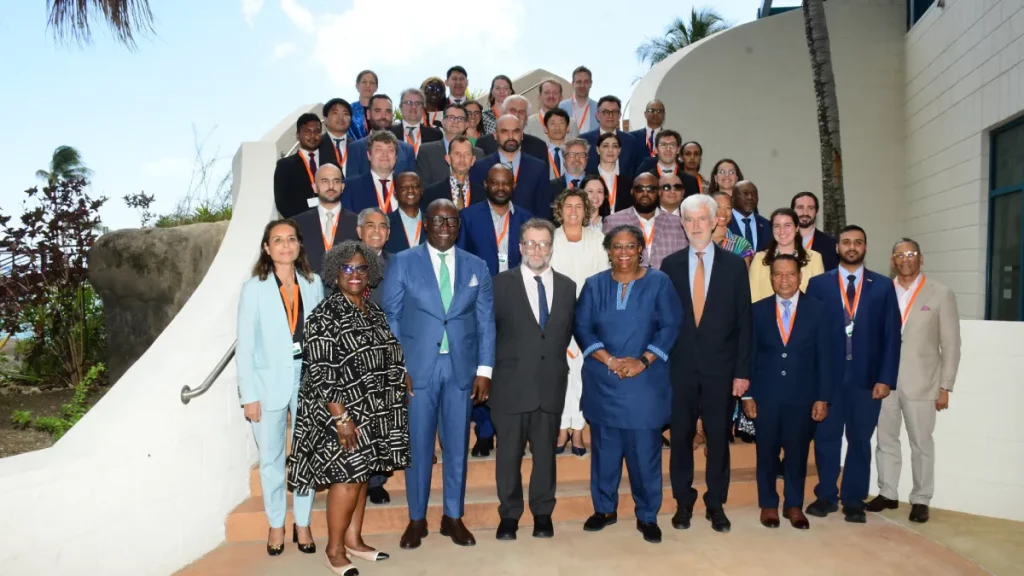28 March 2025, BRIDGETOWN: Senior finance officials from the V20 Group of Finance Ministers of the Climate Vulnerable Forum (CVF-V20) strategized on how to better secure climate finance and urgent international financial reform, amid intensifying geopolitical headwinds. The Senior Officials Meeting (SOM) noted that those “least responsible for the climate crisis are trapped in a financial system designed to fail them.” The meeting was held across March 26 and 27, with over 40 countries participating, including two incoming CVF-V20 members joining as observers.
Established as the Climate Vulnerable Forum by 11 governments in 2009, with its finance ministries established as the V20 Group of Finance Ministers in October 2015, the CVF-V20 is an independent intergovernmental group with over 70 members from developing countries.
“The CVF-V20 remains steadfast in its mission to increase representation of the climate vulnerable in the global arena, enhance access to climate finance and capital markets, and accelerate capacities to mobilize resources,” said Mr. Jason Daniel who chaired the meeting representing the Barbados CVF-V20 Presidency.
The Senior Officials Meeting (SOM) is the most important convening prior to the Ministerial Dialogue that will take place in late April on the sidelines of the World Bank and International Monetary Fund (IMF) Spring Meetings. In addition to the international financial architecture reform agenda, the SOM highlighted the crucial role of the Fourth International Conference on Financing for Development (FfD4), the Baku-to-Belém Roadmap to $1.3 trillion, and the Belém Health Action Plan.
At the meeting, senior CVF-V20 officials pointed to issues requiring rapid resolution:
- The financial system is unresponsive to vulnerable country needs where the cost of capital is too high, debt burdens are soaring, and concessional finance is drying up. Officials said this is not just fiscal misalignment; it is systemic injustice amid a worsening climate crisis where the absence of resilience means perpetual peril for countless communities.
- Officials said the world must recognize the climate crisis as a debt crisis that threatens to irreversibly inundate efforts to overcome today’s development challenges. In 2023, V20 countries, already reeling from escalating climate shocks, were forced to spend scarce resources on debt service instead of health, education and resilient infrastructure. Senior officials agreed to elevate the need to form a V20 debt advisory group to enable structured collaboration across members, focused on support relating to short-term liquidity needs and long-term liabilities management.
- Officials agreed development finance must serve the climate-vulnerable. International development assistance (IDA) and official development assistance (ODA) remain essential, yet are in decline. They agreed the IMF’s Resilience and Sustainability Facility must eliminate barriers to access, and that the concurrent program is a hurdle to long-term resilience, not a solution.
- The meeting noted MDBs must be fit for purpose. Loans priced above a borrower’s medium-term GDP growth rate are unjust and MDBs must offer financing below that threshold even as it scales catalytic instruments like local currency financing, guarantees, and first-loss capital to crowd in private finance.
- Officials agreed pre-arranged finance must become the default measure, not the exception. In 2022, only 2% of crisis finance was pre-arranged and of that, just 1.4% reached low-income countries. They said this must change, while highlighting the Global Shield against Climate Risks as an opportunity for other initiatives to complement and scale delivery of fast liquidity when disasters strike.
While the $300 billion climate finance goal set in Baku remains insufficient to meet the scale of the crisis, the SOM identified the Baku-to-Belém Roadmap as a critical opportunity to bridge the funding gap. Key components of the Roadmap include addressing the adaptation shortfall, fresh capital injections into multilateral development banks, and improved debt solutions to expand fiscal space for climate investments.
With the growing health challenges of climate vulnerable countries, the Belém Health Action Plan underscored that health care systems in these countries must be able to withstand climate shocks, with trauma centers needing to be built closer to regions susceptible to climate disasters. Other critical priorities within the health agenda, include expanding disease surveillance, mental health support, and ensuring access to essential health services such as dealing with heat stress.
Emphasizing the growing risk of the health challenges, Sara Jane Ahmed, CVF-V20 Secretariat Managing Director of the V20 Finance Advisor, said that:
“While we should gauge climate conditions by trends instead of year-by-year snapshots. We know we are clearly on the most dangerous trajectory and time is not on our side. The rapid rise in temperatures has translated directly to an increase in extreme heat stress.”
Other discussions in the SOM included the main components of the CVF-V20’s work plan, such as Climate Prosperity Plans — a flagship initiative that serves as an investment strategy to turn climate vulnerability into climate prosperity. It is specifically designed to support climate-vulnerable nations transform climate risks into bankable opportunities. More than just a fully costed roadmap for low-carbon and climate-resilient development, a CPP is a long-term national investment and technology access strategy that focuses on the convergence of development, climate, and nature.
The Senior Officials Meeting set the stage for discussions that will take place during the Ministerial Dialogue. These discussions will focus on engagements with multilateral development banks (MDBs), international financial institutions (IFIs), and key development partners, including BRICS, G7, G20, and G24.
A key priority is for the official recognition of the V20 as an intergovernmental group within the IMF and World Bank Group.
The CVF-V20 looks forward to welcoming four new members during the April Ministerial Dialogue: Cabo Verde, Gabon, Solomon Islands and Somalia.
—
About CVF-V20:
The CVF-V20 represents 70 member-countries from small island developing states (SIDS), least developed countries (LDCs), low-to-middle income countries (LMICs), landlocked developing countries (LLDCs), and fragile and conflict-affected states (FCS). Working together, the CVF-V20 aims to achieve climate justice through the realization of Climate Prosperity Plans, which contain ambitious economic and financial resilience strategies designed to attract investment and resources that advance the attainment of the Sustainable Development Goals (SDGs), 30×30 Global Biodiversity, and help keep the average global temperatures to the Paris Agreement’s 1.5°C safety threshold.
Contact:
For media enquiries, please contact media@cvfv20.org.
For latest updates, please follow us on:
CVF-V20 Membership
Africa: Benin, Burkina Faso, Chad, Comoros, Côte d’Ivoire, Democratic Republic of the Congo, Eswatini, Ethiopia, The Gambia, Ghana (Troika), Guinea, Kenya, Liberia, Madagascar, Malawi, Morocco, Mozambique, Namibia, Niger, Rwanda, Senegal, Sierra Leone, South Sudan, Sudan, Tanzania, Togo, Tunisia, Uganda
Asia: Afghanistan, Bangladesh (Troika), Bhutan, Cambodia, Kyrgyzstan, Maldives, Mongolia, Nepal, Pakistan, Philippines, Sri Lanka, Timor-Leste, Vietnam
Caribbean: Barbados (Chair/Troika), Dominica, Dominican Republic, Grenada, Guyana, Haiti, Saint Lucia, Suriname, Trinidad and Tobago
Latin America: Colombia, Costa Rica, Guatemala, Honduras, Nicaragua, Paraguay
Middle East: Jordan, Lebanon, Palestine, Yemen
Pacific: Fiji, Kiribati, Marshall Islands, Nauru, Palau, Papua New Guinea, Samoa, Tonga, Tuvalu, Vanuatu
Incoming Members: Cabo Verde, Gabon, Solomon Islands, and Somalia




